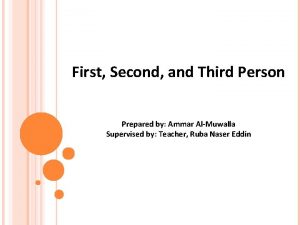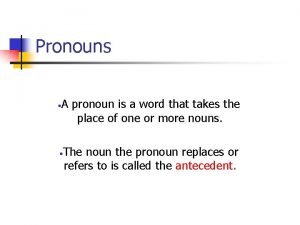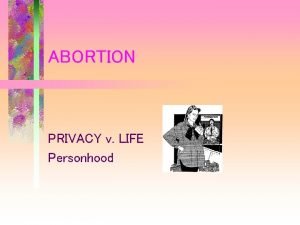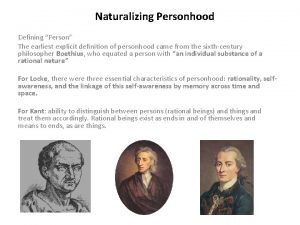PERSONHOOD WHAT IS PERSONHOOD Are you a person










- Slides: 10

PERSONHOOD

WHAT IS PERSONHOOD? • Are you a person? • What about Superman? C-3 PO? A 9 -month-old baby? A fetus? • Person: a philosophical term – a being who is part of a moral community • Human: biological term – a being containing human DNA • Are there non-humans who deserve moral consideration? (E. g. , AI, Koko) • Are there humans who don’t deserve moral consideration? (E. g. , Fetus, PVS, someone who has “surrendered” personhood through inhumane action)

SO, WHAT MUST ONE POSSESS TO BE PART OF OUR MORAL COMMUNITY, AND DESERVING OF OUR MORAL CONSIDERATION? Some ideas: • Contemporary American legal scholar, John Noonan, uses the “genetic criterion. ” (You’re a person if you have human DNA, you’re not if you don’t. ) • What about individual cells? Corpses? Are they persons?

PHILOSOPHY PROF. MARY ANN WARREN OFFERED 5 CRITERIA, TERMED “COGNITIVE CRITERIA”: 1. Consciousness (of objects and events external and/or internal to the being), and in particular the capacity to feel pain; 2. Reasoning (the developed capacity to solve new and relatively complex problems); 3. Self-motivated activity (activity which is relatively independent of either genetic or direct external control); 4. The capacity to communicate, by whatever means, messages of an indefinite variety of types, that is, not just with an indefinite number of possible contents, but on indefinitely many possible topics; 5. The presence of self-concepts and self-awareness. • Rules out fetuses, but it also rules out young children (not self-aware until at least 18 months)

SOCIAL CRITERION • You’re a person whenever society recognizes you as a person, or whenever someone cares about you • Good, if, for instance, we’re trying to expand rights to primates, but what about a human no one cares about?

CAPACITY FOR SENTIENCE • Contemporary Australian philosopher Peter Singer thinks the key to personhood is sentience--the ability to feel pleasure and pain. • Ignores species, instead looks at a being’s capacity to suffer. So, it’s wrong to inflict unnecessary pain to anything that can feel, but if it can’t feel, then we do no harm by excluding it from moral consideration. • This means fetuses younger than ~23 weeks aren’t persons, nor are those in a PVS, but any animal with a developed CNS IS a person.

GRADIENT THEORY OF PERSONHOOD • Personhood is not all or nothing, it comes in degrees, and can be lost or gained. • In this view, a fetus would grow in personhood as cognition develops. So, mother and fetus are persons, but the interests of beings with more personhood get more weight. • Beyond the mother/fetus distinction, can I be more of a person than you?

SO WHERE DO WE DRAW THE LINE? • Viability? • Quickening? • Brainwaves? • Judith Jarvis Thompson – many individuals argue that development from conception to childhood is continuous, so drawing line of personhood would be arbitrary. This, she says, is analogous to saying that an acorn is the same thing an oak tree. • QUESTION OF POTENTIAL (H and O have potential together of being water, but does that mean they are water? )

FUTURE OF VALUE ARGUMENT • In having an abortion, you are depriving a fetus of a future of value. • Marquis claims: Killing is wrong because it deprives an entity of a future of value. • Brown claims: Killing is wrong because it deprives a self-conscious being of a self-represented future of value (and fetuses are both unable to be self-conscious and unable to self-represent their future). • But how far back can you go with this logic? What about sperm? Even skin cells? • On a future of value argument, killing a fetus is like failing to conceive a baby one could conceive. Consider the following example involving embryo creation and destruction. John and Kathy are infertile. They have in vitro fertilization (IVF). They produce an embryo. The embryo is about to be implanted when John and Kathy change their mind. They decide they don't want to have children. The embryo is destroyed. Sam and Edwina are infertile. Edwina produces an egg. Sam produces some sperm. Doctors extract a single sperm for the purposes of ICSI (intracytoplasmic sperm injection), the preferred method of IVF. Just as they are about to inject the sperm, Sam and Edwina interrupt them and tell them they have changed their minds. They don't want children. The sperm and egg are destroyed.

JUDITH JARVIS THOMPSON’S FAMOUS THOUGHT EXPERIMENT “You wake up in the morning and find yourself back-to-back in bed with an unconscious violinist. A famous unconscious violinist. He has been found to have a fatal kidney ailment, and the Society of Music Lovers has canvassed all the available medical records and found that you alone have the right blood type to help. They have therefore kidnapped you, and last night the violinist's circulatory system was plugged into yours, so that your kidneys can be used to extract poisons from his blood as well as your own. The director of the hospital now tells you, ‘Look, we're sorry the Society of Music Lovers did this to you--we would never have permitted it if we had known. But still, they did it, and the violinist is now plugged into you. To unplug you would be to kill him. But never mind, it's only for nine months. By then he will have recovered from his ailment, and can safely be unplugged from you. ’ Is it morally incumbent on you to accede to this situation? No doubt it would be very nice of you if you did, a great kindness. But do you have to accede to it? ”


















